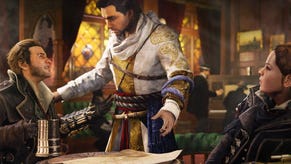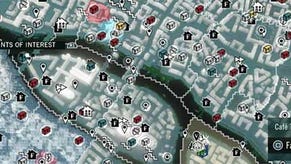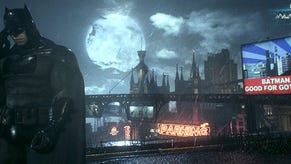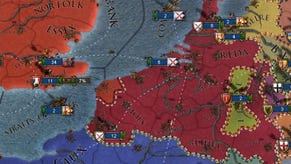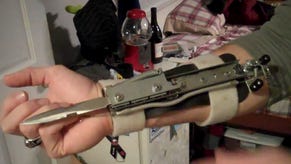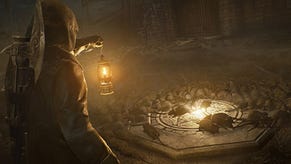Wot I Think - Assassin's Creed Unity
Routine Rouge
Assassin's Creed Unity is the latest in Ubisoft's series of historical-set open world action-adventure games. It stars a French nobleman named Arno Dorian, who becomes an Assassin (stealthy free-running dude battling against an evil conspiracy theory) in 18th century Paris, around the time of the French revolution. It adds co-op and gear customisation to the seven-year-old formula. It's been out for three days now, and I've been playing it for much of that time.
"How come you wound up being RPS's Assassin's Creed guy?", asked a friend when I mentioned I was tackling Unity, his tone that of someone asking a miserable-looking soldier why he's on latrine duty.
There's much to unpick there.
For starters, has this series become so stodgy that it's now looked upon with contempt rather than, as was the case for at least the first three games, one that was always on the verge of greatness? How did that happen? How many of my peers think that of it, and wonder why the hell I'd spend my time with these games year after year? And how representative is their weariness with Assassin's Creed of the general public's? Do they also find the barrage of trailers exhausting, do they worry that feature creep has given the elbow to invention, are they annoyed that the free running controls are still regularly flinging them to the wrong places after all this time?
Perhaps more importantly (at least from a navel-gazing perspective, which is why you're on this site, right?), why do I choose to play Assassin's Creed games for RPS, year-after-year? Is it because no-one else does, so I default to it from a sense of duty? Not really. This isn't a particularly Assassin's Creedy site, after all.
The answer is Doctor Who. I have always watched Doctor Who. I will probably always watch Doctor Who. Doctor Who is mostly not great, for reasons I will not divert into now for fearing of generating 3000 words about Saturday evening television that nobody wants when they're trying to decide whether to buy an Assassin's Creed game. Sometimes, though, Doctor Who is great. Really, really great. Because that potential is always there - in any given episode, the right idea, the right writer, the right director, the right cast member could result in an hour of brilliant and/or hilarious science fiction rather than a string of rubber masks and emotionally manipulative deus ex machinas - I keep watching.
That's what I do with Assassin's Creed games. 1 was a mess, but something sparkled beneath its dreary mini-games. II ditched some of the better ideas but laid solid foundations. Brotherhood was a party. Revelations was rinse and repeat. III had less personality than SEO. IV: Black Flag was A PARTY - one of my favourite games of last year. The potential is always there, because like Doctor Who and anything goes time/space travel, Assassin's Creed has any city from human history (and beyond) and anything goes movement to call from. That's why I continue to be RPS's Assassin's Creed guy.
After months of promotion, I hadn't seen anything of Unity to make me suspect it was in the Even-Numbered Star Trek Movie category. It looked to be as vanilla as Assassin's Creed gets - man in hood, European city a couple of centuries ago, climbing, chasing, collecting. I won't get into the politics of the controversy around the developer's initial claim that women weren't included as avatars in co-op mode for animation workload reasons, but while I accept that the real intention was that everyone was playing as ACU lead Arno in an outfit of their choosing, that in itself reveals a lack of verve or ambition.
Stick to the familiar even when doing something as ostensibly surreal as having four to all intents and purposes identical men playing hopscotch across 18th Century Paris' rooftops together. It is simply boring for everyone to be the same (not particularly interesting) character, and the fundamental trouble with ACU, as with Revelations and III, is that it doesn't seem to mind being boring. Assassin's Creed is repeating itself knowing full well that it's repeating itself.
The same chase missions and the same escort missions. The same 'desynchronisation imminent' if you fall too far out of range of your target or leave the immediate mission area. The same stealth-that-isn't-really-stealth. The same getting stuck on small walls or randomly hurled off the side of a tall building. The same map full of endless icons. The same lavishly-detailed but exposition-droning supporting cast/mission-givers. The same placing of genuine historical drama on a backseat to the endless war of attrition (and exposition) between the Assassins and the Templars. The same faintly twisted focus on earning and spending filthy lucre more than saving the day.
No boats, no forests, but oh well. Black Flag always seemed like a beautiful accident. I didn't expect Unity to rip up the rule book in any meaningful way, but I did have plenty of hope that it would have flow and zest, in the way that Brotherhood did despite not doing much that II didn't already. That's why I continue to be RPS's Assassin's Creed guy.
The good news is that Unity isn't III. It doesn't have that oppressively dour tone, it doesn't front-load itself with hours of tutorial, and its city is probably the best (by which I mean, enjoyable to look at and climb around) city Assassin's Creed has done yet. I'll come back to that shortly.
The bad news is that it's not Brotherhood either. Its conservatism runs deep, it doesn't imbue the familiar with much spirit, and it tries to mask this with the most egregious amount of feature creep this series has yet seen. In other words, its closest analogue is Revelations.
As that comparison suggests, it's by no means a disaster, despite what internet screeching might claim, nor is it quite a damp squib. Its greatest sin is to be uninspired, and its second greatest sin is to try and distract from that with a skein of ugly Skinner box mechanics designed to keep players pressing its levers. Some of these rely on playing a mobile companion app, and there are options to short-cut with real money. I'll come back to that shortly too.
The city is its redemption, but only just. 18th century Paris might on paper sound like it would offer a similar experience to II's 15th century Florence or Brotherhood's 16th century Rome, but in practice the texture of the terrain is all different. The city's topography undulates enormously, raising to the huge peaks of Notre Dame and dropping to street-level markets. It's a far more disorientating and to some extent spectacular place to cross, and its heightened irregularity lends a great deal more life to the setting.
I know, to a degree, this is a case of the engine and no doubt the budget reaching new heights now AssCreed's development focus is on Xbone and PS4. This is particularly true of the vast and impressive crowds; sure, smoke and mirrors are in abundance, but the overall effect is successful - lots and lots of people. Bustle. A city, not a theme park. Even without them, this would be a better city, a more architecturally organic-feeling one, and one whose major landmarks require some thought about the approach to scaling them, rather than relying on the AssCreed tradition of arbitrary handhold placements in order to force you the long way round.
There are more indoor spaces too, and a big drop in loading screens, though these improvements are laid low by the enduring irritations of the broadly unchanged movement system, and its tendency to stick you to things you don't want to stick to, or hurl you away from things you want to reach. Sometimes scaling a tall building, ducking through a window, sprinting through a busy kitchen then vaulting into a tree or onto a rooftop beyond Just Works, and it looks and feels slick - that satisfying middleground of the game responding to your actions and correctly second-guessing your intentions. Sometimes - too often - it's like trying to reverse a milk float around Milton Keynes.
This becomes particularly apparent in the co-op missions, when you've got up to four people resolutely failing to move as the fluid flock trailers suggest. Everyone's everywhere, stuck to things, falling off things, landing in front of the guy you were about to air assassinate... Combine that with the still-rudimentary stealth system, and most of the time these (optional) missions devolve into a street brawl rather than a Parkour-fuelled heist. (And, yeah, everyone looks the same bar superficial costume colouring and frills, which means you can't really glean any personality from anyone you play with). Co-op has its moments, and the mere presence of others does remix the familiar to some extent, but expect a mad free-for-all rather than Arno's 11.
My next point has been levelled at the series for many games now, and I can't know what has and hasn't changed under the hood, but the movement system feels as though it needs a ground-up reworking. There are fancy new animations aplenty, making it look more athletic and changeable, but bar a new button intended for quicker downward climbing and ducking under low obstacles while running, the practice is broadly unchanged since its 2007 origins.
Of course, no-one argues that Call of Duty needs to change the way you fire a gun after a dozen-odd iterations, but Assassin's Creed has always been about so much more than making other men fall over. It is supposed to be about the sheer joy of movement and exploration, and for as long as that is undermined by archaic and sometimes chaotic systems, it's hiding its own light under a bushel. A bushel that you'll probably get stuck to for three seconds while trying to climb over it.
Much more in its favour is that ACU gets the hell on with it far more quickly than the majority of its predecessors. While a number of its major toys, both new and returning, are locked off into the later chapters of the main campaign, it offers you the freedom of the city and the majority of its side-quests around half an hour in - a far cry from the miserable hours of waiting and repeated tuition of the last few games. It has far more confidence that its players have played at least one AssCreed previously - perhaps a little excessively so, as figuring out a couple of the movement and weapon tweaks took me a little while.
Even so, if you're coming to this from a cold start it's both less weighed down by its own garbled continuity and more focused on the business of making merry in the old world than Assassin's Creed has been for quite some time. The much-maligned future meta-plot is mercifully more backgrounded than ever before, and while most of what is there is primarily loreballs cutscenes, there's some real flair when it sees you temporarily playing in Paris in other time periods - essentially as an excuse to show the Eiffel tower, the Moulin Rouge era, the metro... So much art for perhaps so little purpose, but if it's laying the seeds of a true time-hopping AssCreed, I remain resolute that the series retains its potential for greatness.
Unity is by no means a fresh start, but it is shorn of some of the series' traditional baggage. It's not a bad jumping on point, but I'm still going to say that last year's Black Flag is the better place to start. It's a better game, a fresher game, and it isn't drowning in quite so many needless features.
Which brings me to what's really been the nail in an unspectacular but fairly solid coffin. Feature creep ad nauseum. There are four separate 'currencies' with which to purchase assorted character and gear upgrades in Unity; three different types of rank to strive for; dozens of weapons, each with their own upgrade; permanent skill boosts; purchasable temporary skill boosts; passive skills; active, recharging skills; dozens of armours, each with their own upgrade; a glut of interlinked side-missions with unique items to unlock; chests which can only be unlocked if you've performed the requisite actions in the companion app; chests which can only be opened if you've performed the requisite actions in Uplay; chests which can only be unlocked if you've poured enough points into your lockpicking ability; options to spend real cash on currency with which to shortcut your way to better kit and abilities; icons, icons, everywhere, and surprisingly few to simply visit and be able to do a thing.
It's confusing at first, but that's not the issue. While I quickly learned to recognise what each icon meant, the game map remained an ugly Pollock of overlapping shapes and dots, while the gear and costume tweaks were too minor or muted to feel at all meaningful. It's sprawl for sprawl's sake.
On top of that, particularly in my first few hours with Unity, so often I'd head towards a tempting icon only be told "no, not now" or "go outside the game and do a bunch of stuff there so that you can open this box or equip this thing." No, I don't want to. I just want to play my game, thanks. In time, I learned to filter out what was in the game and what was trying to snare me within the large Ubisoft network and possibly even part with some cash. I simply stopped seeing blue and gold chests, for instance. Better that way. If only the priority had been on truly freshening up Assassin's Creed rather than turning it into a shopping centre.
In the end, I looked at that map and felt weary. So much to do, so much of it bitty and unsatisfying - hoovering up crumbs. Some missions do have a spark to them, especially those which require you to figure out where something is in the city as opposed to simply pointing you at it, but in the main it's following or brawling, as we've been doing for seven years now.
Not a disaster then, but Unity is Assassin's Creed reverting to type despite its glitzy surface. For that reason, and not for the belly-aching about performance and paygating, Unity is probably one to skip. Despite this, I willingly remain RPS' Assassin's Creed guy. Maybe the next one will be a Blink or Midnight.
Assassin's Creed Unity is out now. Its standard edition (there are a number of more expensive ones, plus a season pass) costs £50/$59, requires Uplay and isn't available on Steam in a number of territories, including the UK.
_____________
A note on performance, put aside from the main piece as PC players' experiences seem wildly inconsistent. While in the main I'm able to maintain at least 30 frames per second at 1080p/Very High on a Radeon 290x (with Unity-specific beta driver) and Core i7 980x, I can't get it to be consistently much higher than that at any setting. It will shoot up to 60 on very rare occasion, but equally it will drop down to around 17 on rare occasion. The average is in the mid-40s, but that doesn't really convey how it feels in practice. At all times, the frame rate spikes wildly, and this noticeably effects how the game feels to play. Despite the speculation of some that this relates to crowd/AI over-taxing the CPU, the drops happen as often in cutscenes, NPC-minimal indoor locations and random bits of rooftop as they do when the streets or buildings are filled with people. In my earlier post about these issues, some felt my relatively old processor was to blame; given it's a six-core chip overclocked to 4Ghz (and that Speedfan shows that none of its core are ever anything like maxed out while running ACU) this seems somewhat unlikely. However, it is possible that its lack of the AVX instruction set featured in later Core chips is causing issues. I can't give you a definitive answer without laying hands on another, highish-end PC (and I simply don't have the cash to upgrade), so I simply relate my own experiences for you to use as you will. For the record, I haven't seen any major glitches.









